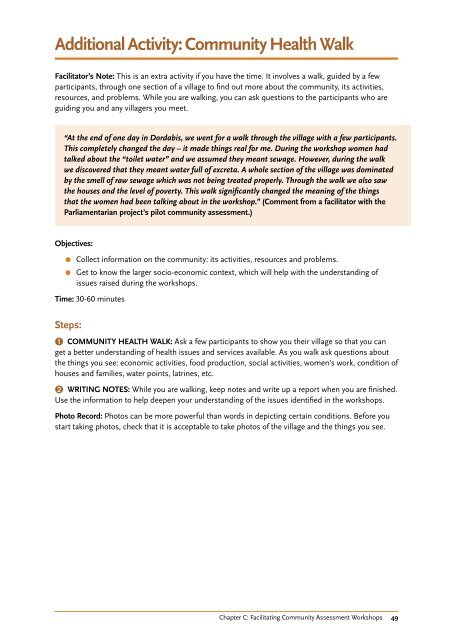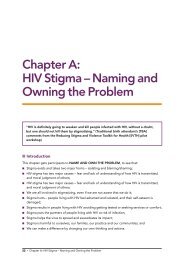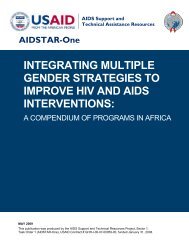Guide for Community Assessments on Women's Health Care - ICRW
Guide for Community Assessments on Women's Health Care - ICRW
Guide for Community Assessments on Women's Health Care - ICRW
You also want an ePaper? Increase the reach of your titles
YUMPU automatically turns print PDFs into web optimized ePapers that Google loves.
Additi<strong>on</strong>al Activity: <str<strong>on</strong>g>Community</str<strong>on</strong>g> <strong>Health</strong> Walk<br />
Facilitator’s Note: This is an extra activity if you have the time. It involves a walk, guided by a few<br />
participants, through <strong>on</strong>e secti<strong>on</strong> of a village to find out more about the community, its activities,<br />
resources, and problems. While you are walking, you can ask questi<strong>on</strong>s to the participants who are<br />
guiding you and any villagers you meet.<br />
“At the end of <strong>on</strong>e day in Dordabis, we went <str<strong>on</strong>g>for</str<strong>on</strong>g> a walk through the village with a few participants.<br />
This completely changed the day – it made things real <str<strong>on</strong>g>for</str<strong>on</strong>g> me. During the workshop women had<br />
talked about the “toilet water” and we assumed they meant sewage. However, during the walk<br />
we discovered that they meant water full of excreta. A whole secti<strong>on</strong> of the village was dominated<br />
by the smell of raw sewage which was not being treated properly. Through the walk we also saw<br />
the houses and the level of poverty. This walk significantly changed the meaning of the things<br />
that the women had been talking about in the workshop.” (Comment from a facilitator with the<br />
Parliamentarian project’s pilot community assessment.)<br />
Objectives:<br />
●●<br />
●●<br />
Collect in<str<strong>on</strong>g>for</str<strong>on</strong>g>mati<strong>on</strong> <strong>on</strong> the community: its activities, resources and problems.<br />
Get to know the larger socio-ec<strong>on</strong>omic c<strong>on</strong>text, which will help with the understanding of<br />
issues raised during the workshops.<br />
Time: 30-60 minutes<br />
Steps:<br />
➊ COMMUNITY HEALTH WALK: Ask a few participants to show you their village so that you can<br />
get a better understanding of health issues and services available. As you walk ask questi<strong>on</strong>s about<br />
the things you see: ec<strong>on</strong>omic activities, food producti<strong>on</strong>, social activities, women’s work, c<strong>on</strong>diti<strong>on</strong> of<br />
houses and families, water points, latrines, etc.<br />
➋ WRITING NOTES: While you are walking, keep notes and write up a report when you are finished.<br />
Use the in<str<strong>on</strong>g>for</str<strong>on</strong>g>mati<strong>on</strong> to help deepen your understanding of the issues identified in the workshops.<br />
Photo Record: Photos can be more powerful than words in depicting certain c<strong>on</strong>diti<strong>on</strong>s. Be<str<strong>on</strong>g>for</str<strong>on</strong>g>e you<br />
start taking photos, check that it is acceptable to take photos of the village and the things you see.<br />
Chapter C: Facilitating <str<strong>on</strong>g>Community</str<strong>on</strong>g> Assessment Workshops 49

















